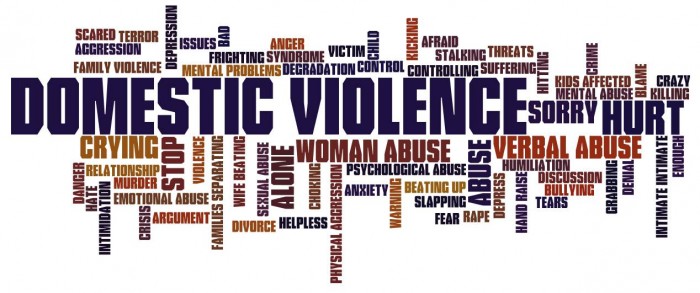Understanding Domestic Violence
Domestic Violence Defined
Domestic violence is the willful intimidation, physical assault, battery, sexual assault, and/or other abusive behavior perpetrated by an intimate partner against another. It is an epidemic affecting individuals in every community, regardless of age, economic status, race, religion, nationality or educational background.

Domestic violence is often accompanied by emotionally abusive and controlling behavior, and thus is part of a systematic pattern of dominance and control. Domestic violence results in physical injury, psychological trauma, and sometimes death. The consequences of domestic violence can cross generations and truly last a lifetime.
The following are a few sites that provide information on the subject and answers to questions you’ve often asked… What is Domestic Violence?
- Domestic Violence courtesy of Stop Violence Against Women
- www.ncadv.org (National Coalition Against Domestic Violence)
- www.faithtrustinstitute.org Faith Trust Institute
- http://www.nyc.gov/html/ocdv/html/home/home.shtml (NYC Domestic Violence Website)
- www.opdv.state.ny.us (NYS Domestic Violence website)
- www.dvsheltertour.org (Safe Horizon)
- www.cybergrrl.com (Statistics about Battered Women Who Kill)
- www.bwss.org (Battered Women’s Support Services)
- http://harrellcenter.hsc.usf.edu (Harrell Center for the Study of DV)
- www.ivatcenters.org (Institute on Violence, Abuse and Trauma)
- www.supportnetwork.org (Support Network for Battered Women)
- www.letswrap.com (Women’s Rural Advocacy Programs)
- www.stopfamilyviolence.com (Family Violence Network)
- www.ici.umn.edu/products/impact/133/res.html (Impact: Resources related to Violence Against Women with Disabilities)
![]()
Rumors and Myths
Rumors and myths are untrue stories accepted without critical examination. Many of these fictional phrases have evolved around Domestic Violence. It is easier to believe these rather than do your homework about the facts.
The following are some sites that present some myths you should know regarding Domestic Violence:
Common Myths about Domestic Violence
![]()
Domestic Violence and Abusive Relationships
- Are you ever afraid of your partner?
- Does your partner threaten to hurt you?
- Does your partner control all the money?
- Has your partner ever pushed you or shoved you, thrown things at you, or forced you to have sex?
- Does your partner stalk you and show up uninvited at your job or when you’re out with friends?
If these experiences are part of your life, you are not alone and help is available in your community. If you are in New York City and are being abused by your partner, Safe Horizon can help you. Safe Horizon is the largest provider of domestic violence services in the country. Our counselors are compassionate and experienced, and our goal is to ensure that you and your children are safe. We understand how painful it is to live with abuse and how difficult it can be to talk about your situation. You might feel hopeless, desperate, confused, and alone. You may not want to tell people about your situation because you feel afraid, ashamed, or embarrassed. If you are in immediate danger, DIAL 9-1-1.
What is Domestic Violence?
Domestic violence, sometimes called battering, relationship abuse, or intimate partner violence, is a pattern of behavior used to establish power and control over another person through fear and intimidation, often including the threat or use of violence. Domestic violence is a crime that can include physical abuse, emotional abuse, economic abuse, and sexual abuse. Batterers use threats, intimidation, isolation, and other behaviors to maintain power over their victims. Domestic violence impacts everyone, regardless of income, race, ethnicity, sexual orientation, or religion. Thirty percent of Americans say they know a woman who has been physically abused by her husband or boyfriend in the past year (Lieberman Research, Inc., Tracking Survey conducted for The Advertising Council and the Family Violence Prevention Fund, July-October 1996). Domestic violence also affects same-sex relationships and men as victims.
If you are being abused, call the hotline 24 hours a day, 7 days a week.
What is Elder Abuse?
Elder abuse is the maltreatment of an elderly or disabled person by a family member or caretaker. Elder abuse can include physical, sexual, or psychological abuse; financial exploitation, and/or neglect, including the denial of basic necessities like food and medical care.
No one, not your caretaker, not a family member is allowed to:
- Deny you meals or medication
- Hide or break your eyeglasses, hearing aid, or false teeth
- Threaten to hurt you or your children, your pets, or friends
- Humiliate, be cruel, or speak harshly to you
- Keep you away from friends and family
- Take your Social Security checks
- Spend your rent or food money
- Steal your belongings
- Hit, beat, push or restrain you
- Force you to have sexual contact
- Keep you locked up
- If you are over 60 and any of these things are happening to you, call Safe Horizon’s 24-hour hotline. Remember, you are not to blame. You have a right to be safe and feel secure in your own home.
What is Child Abuse?
Child abuse, or child maltreatment, is an act by a parent, caretaker, sibling, family member, or other person that results in the physical or emotional harm or death of a child. Emotional abuse, neglect, physical abuse and sexual abuse are all different forms of child abuse.
To report suspected child abuse in New York, call the New York State Child Abuse Hotline: 1 (800) 342-3720
![]()
Hotline Phone Numbers
National Domestic Violence Hotline
1-800-799-SAFE (7233)
-800-787-3224 (TTY)
National Teen Dating Abuse Helpline
1-866-331-9474
1-866-331-8453 (TTY)
In New York City ONLY
Domestic Violence Hotline: 1-800-621-HOPE (4673)
Crime Victims Hotline: 1-866-689-HELP (4357)
Rape & Sexual Assault Hotline: 1-212-227-3000
TDD phone number for all hotlines: 1-866-604-5350
Serenity House Submenu
- Serenity House ~ An Apartment With A View
- Domestic Violence Services
- Understanding Domestic Violence
- Domestic Violence Statistics
- Domestic Violence Survival Kit
- Hotlines & Support Groups
- Domestic Violence Prevention
- Warning Signs of Domestic Violence
- Domestic Violence Housing Resources
- How an abuser can discover your true Internet Activities
- Help Us Develop Safe, Affordable Housing for Survivors
- Why was it named Serenity House?
- Behind Closed Doors, Abuse Caught on Tape – ABC News
Hotline Phone Numbers
National Domestic Violence Hotline
1-800-799-SAFE (7233)
1-800-787-3224 (TTY)
National Teen Dating Abuse Helpline
1-866-331-9474
1-866-331-8453 (TTY)
In New York City ONLY
Domestic Violence Hotline: 1-800-621-HOPE (4673)
Crime Victims Hotline: 1-866-689-HELP (4357)
Rape & Sexual Assault Hotline: 1-212-227-3000
TDD phone number for all hotlines: 1-866-604-5350
Volunteer Adult Literacy Tutor
Become a volunteer tutor in reading, writing, G.E.D. Prep, or English as a Second Language (ESL).
Call the Literacy Partners at 646-237-0120 or visit the Adult Literacy Tutor program, or Literacy Partners. Help change lives and make New York City one of the country’s most literate cities.

